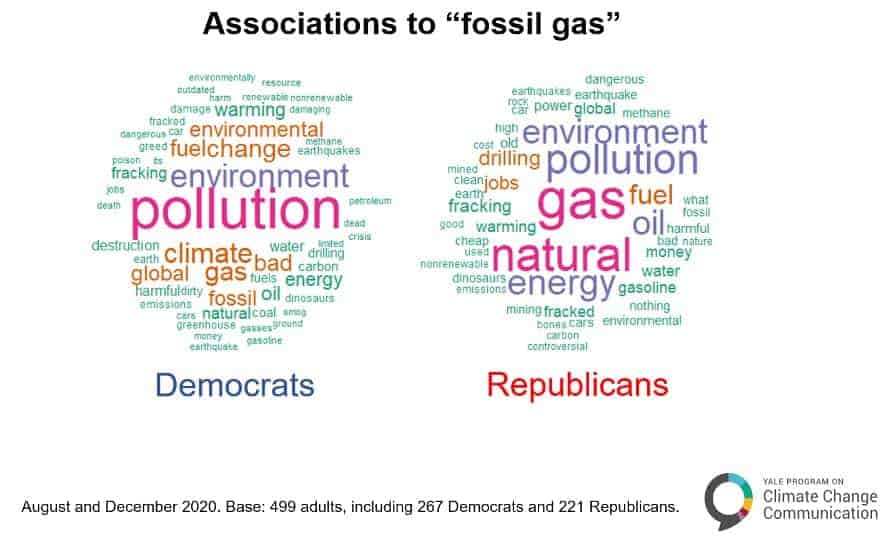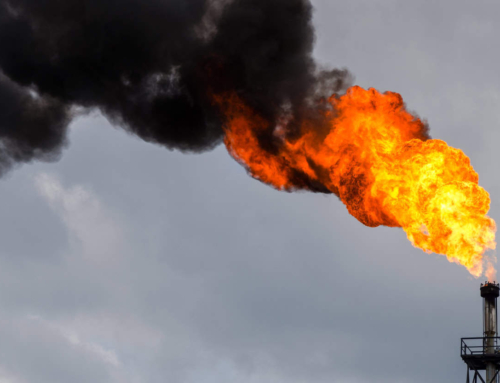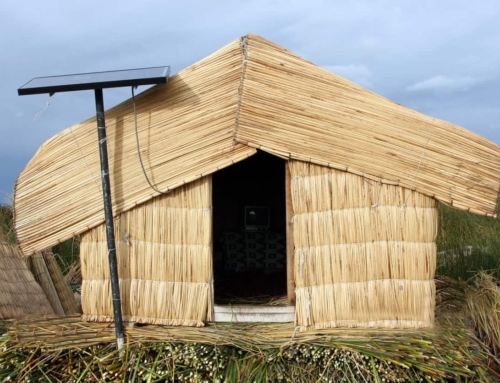Natural Gas, Fossil Gas, or Methane… Which Should We Use?
Reality and truth should be bedrocks in climate communications, but what we believe often informs reality. Words influence these beliefs and thus our collective reality. Choose words that unconsciously activate the wrong neurons in the brains of our audience and we lose. Choose the right ones and maybe our climate cause will triumph.
The words we choose to describe gas (CH4) such as natural gas, fossil gas, or methane all activate different pathways depending on your audience according to a new study by the Yale Program on Climate Change Communication.
The study surveyed the reactions of Democrats and Republicans to these words and concluded…
“Taken together, the findings from the two experiments indicate that both Democrats and Republicans have more positive feelings towards “natural gas” than “methane” or “methane gas.” However, the terms “fossil gas” and “fracked gas” produced larger partisan differences than any of the other terms we tested. Democrats felt slightly more negative, while Republicans felt much more positive about these two terms compared to the methane-related terms.
Overall, we find that the terms “methane” and “methane gas” are perceived as bad by both Democrats and Republicans. By contrast, the terms “fossil gas” and “fracked gas” have contradictory effects among Democrats (who perceive them as bad) and Republicans (who perceive them as good).”
This sounds clear. It seems if we want to stop fracking or the use of natural gas, we should use the word methane, right? Not quite so fast.
The study is fine in what it tested. But I have several caveats. The first is that surveying existing opinions and reactions is backward looking and reactive. It simply measures what people think now, not necessarily what we would like them to think. While there is a slight negative associated with the word methane for both Democrats and Republicans, this doesn’t mean we can’t develop a frame that is more negative and get it accepted into our collective vocabulary.
Fossil fuel think tanks do this all the time. Witness, clean natural gas. Or the even more insidious renewable natural gas. The simple use of one positive adjective changes perceptions and the frame.
The problem is that environmental and climate organizations struggle to get frames into the vernacular and use them consistently. So when in doubt, we can use the term methane.
Secondly, we can use the term fossil gas with our base, and methane with a broader audience that includes Republicans. For example when lobbying your legislators. Again, environmental and climate organizations are not very good at targeting, but we can try.
Lastly, and this should be our communication goal, we can create a negative frame around gas and use this consistently in our contacts with media. How do we do that? Add our adjective. How about dirty methane or dirty natural gas? Remember, good messaging activates your base, attracts the middle and pisses off the opposition. If your message or frame doesn’t alienate the climate deceivers, then it’s too weak.
To succeed, we must stop using the term natural gas. We also need to change the public’s perception of gas in general. We did it with clean renewable energy. We did it with dirty coal. We can do it with methane and dirty methane across the board, and fossil gas with targeted audiences. We can also use our own positive frames to paint a vision of a better world. For example, electrify everything with clean renewable energy.
What do I smell? It’s gas… and it smells bad.
Hobie,
‘We are all connected. Savor the Earth!’™
Hobart Stocking
SkyWaterEarth.com
hobart@skywaterearth.com
651-357-0110
Facebook: @SkyWaterEarthConnected
Twitter: @SkyWaterEarth








Leave A Comment